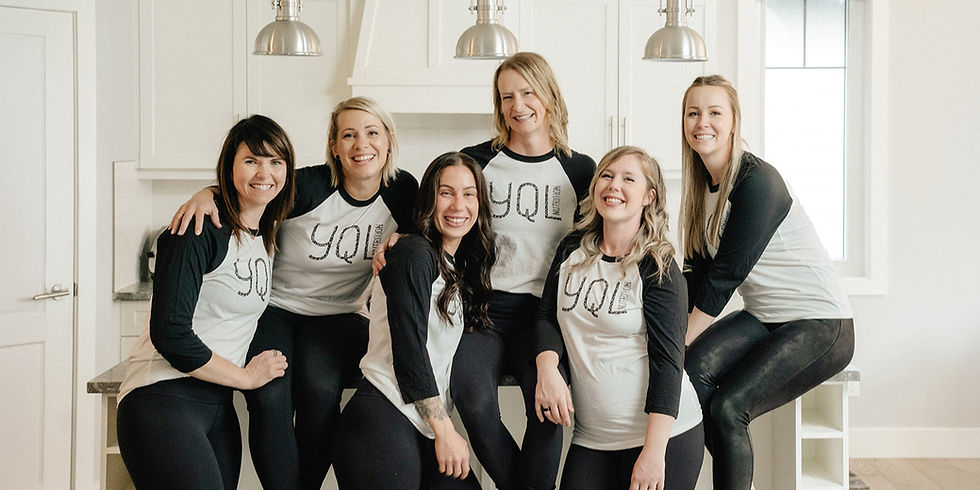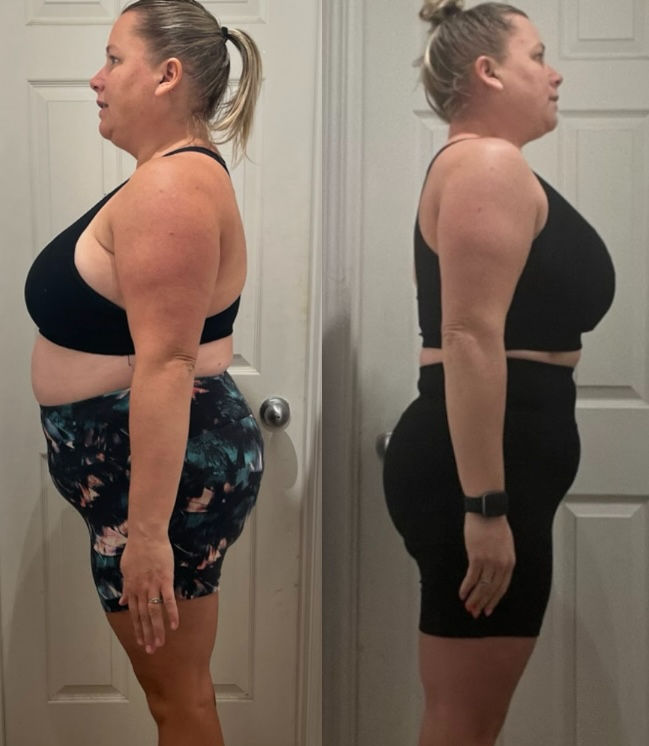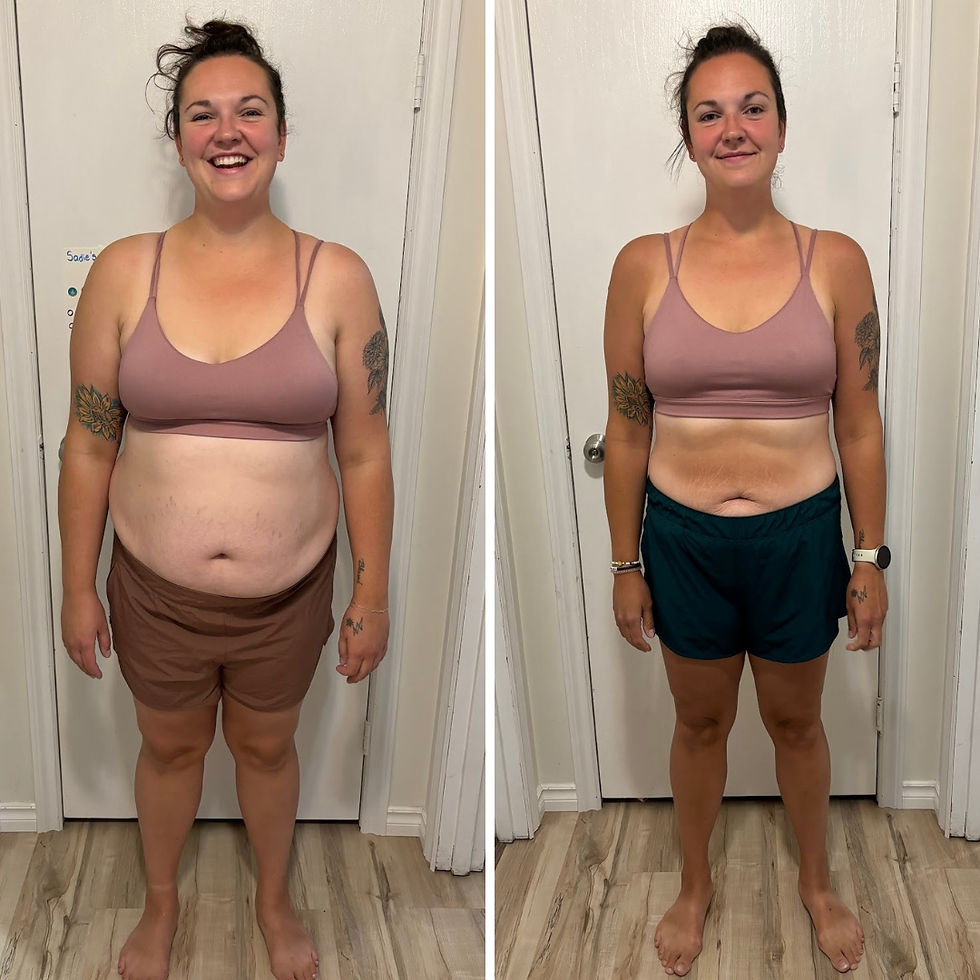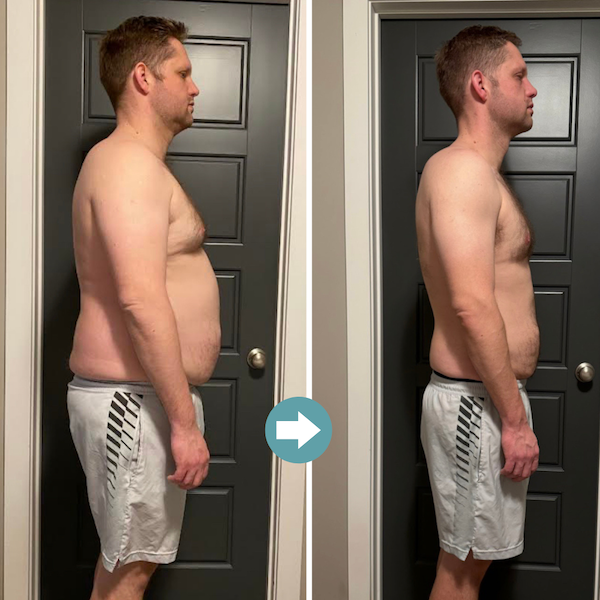Why Tracking Your Food Is One of the Most Effective Tools for Fat Loss — And Keeping It Off
- robyn3051
- Jul 16, 2025
- 9 min read
Updated: Aug 5, 2025

At YQL Nutrition, we’ve helped hundreds of people transform their bodies and their relationship with food — not through crash diets or extreme restrictions, but by giving them the tools to understand how to nourish their bodies in alignment with their goals.
One of the most powerful tools we use > Tracking!
We track food, weight, body composition indicators, biofeedback markers (how your body FEELS - think hunger, energy, cravings, sleep, stress, training performance and recovery), and consistency.
When working towards a goal some form of TRACKING is super powerful to understand where you are and where you want to be!
Think about it this way
- if you were wanting to buy a house or save for retirement, you would track your finances
-if you were trying to conceive, you would track your menstrual cycles,
-if you wanted to run a marathon, you would track your miles
It all revolves around the same principles - tracking consistency and progress is an effective tool to get you to where you want to go!
If you’re working toward fat loss and long-term health, tracking what you eat can be a game-changer.
Let’s break down why tracking your food works, and how it can help you achieve (and maintain) fat loss results without falling into the yo-yo dieting cycle.
The Benefits of Tracking Your Food
✅ Awareness = Power
Most people have no idea how much they’re actually eating — or not eating — in a day. Tracking takes the guesswork out. It gives you an accurate picture of your intake so you can make changes that actually move the needle toward your goals. So many people feel they are “doing everything right” and then once they start tracking, they become aware of areas they could adjust in order to create the change they desire!
"Self-monitoring of dietary intake is the cornerstone of behavioral weight loss treatment, and the frequency of monitoring is significantly associated with weight loss: the more records kept, the more weight lost." (1)
✅ Objective data > emotions
When you track, you’re making decisions based on facts, not feelings. This helps take the emotion out of the equation and allows you to focus on what’s working or what needs adjusting.
When it comes to fat loss, we all want to get to our end result as fast as possible. While this is the goal, we also need to have realistic expectations as to how long fat loss truly takes when done RIGHT. Without data, we often make changes too quickly, which ultimately can lead to the change becoming unsustainable, leading to us quitting before we reach our desired goal.
✅ Flexibility + progress
Tracking doesn’t mean restriction. In fact, it allows you to enjoy the foods you love while still creating a calorie deficit. No more extreme measures like cutting out entire food groups or drastically slashing calories — you can make room for treats while still seeing results!
Want to have ice cream with your kid after their baseball game? Or a glass of wine on date night? You absolutely CAN do that when you use this approach!
✅ Adaptability when progress stalls
Fat loss is rarely linear. When you have a baseline of consistency through tracking, this will allow you to make calculated adjustments so you can continue to see progress, rather than feeling “stuck” and frustrated.
✅ Understand your body + food
Tracking teaches you proper portion sizes, the makeup of foods (protein, carbs, fats), and how certain foods make you feel. This connection between your food choices and your hunger, energy, digestion and more is super powerful information on how to make food choices that allow you to feel your best!
✅ Prioritize protein to preserve lean muscle
When losing fat, we want to preserve lean muscle — that’s what gives your body shape and keeps your metabolism healthy.
Eating enough protein helps maintain muscle, keeping your body strong and your fat loss sustainable.
When you track your food, you can ensure you are eating enough protein while staying at your target calories!
If you only focus on calories, you are at high risk of losing muscle if you are undereating protein - this is where a lot of people go wrong when trying to lose weight - they don't care where that weight is coming from, as long as the scale goes down, Muscle is our most metabolically active tissue, so we want to make sure we are losing FAT and maintaining as much muscle as possible in the process!
✅ Improve your relationship with food
When you understand food, you stop fearing it. Tracking helps you see that no food is “bad” — it allows you to eat foods you enjoy and have flexibility with your food choices. You don't have to give up your favourite foods, avoid social events, or feel like one meal will “ruin” all your hard-earned progress.
Why Most People Don’t Really Know What They’re Eating
Many people who struggle with weight loss genuinely believe they are eating less and moving more than they actually are — and this gap between perception and reality can make progress feel impossible.
A study published in the New England Journal of Medicine found that individuals who reported consuming very few calories and exercising regularly were, unknowingly underestimating their food intake by an average of 47% and overestimating their physical activity by about 51% (2). This means someone might think they’re eating 1,200 calories a day when they’re really consuming closer to 1,800 or more, or believe they’re burning far more through exercise than they truly are.
One of the main reasons individuals have perceived ‘weight loss resistance’ isn't a slow metabolism or unbalanced hormones; instead, people actually misjudge how much they eat and move (calories in vs calories out). This is a powerful reminder of the importance of honest, accurate tracking when working toward weight loss goals.
When you track both your food and exercise, you get a clear, honest picture of where you’re at. Tracking is one of the most effective tools for behaviour change — if you don’t know where you are, how can you map out where to go?
Why Intuitive Eating Doesn’t Work (At First) for Fat Loss
We love the idea of intuitive eating once you’ve learned how to fuel your body. But if you’ve never tracked before? You’re guessing. And trust us when we say, nobody is “guessing” their way to their dream physique!
The reason intuitive eating doesn't work specifically for fat loss is because most people
Don't understand what they are actually eating to begin with - aka they don't know their starting point
Don't have a foundation of nutritional knowledge in order to make adjustments that align with their goal
Are often too emotional to make decisions regarding their fat loss progress - us humans are impatient and tend to make changes too quickly rather than be objective and stay the course
Don't understand their true hunger and fullness cues
*** it is because of these reasons that people tend to rely on EXTREME measures such as very low calorie diets or cutting out complete food groups
The thing is - you DON'T have to do this in order to see results! AND it is also not sustainable long-term!
How Tracking Helps You Keep the Weight Off
Tracking isn’t just for fat loss — it’s also for the phase that comes after … maintenance.
When you reach your goal, tracking helps you:
➡ Bring calories up to maintenance levels to support your metabolism, hormones, and energy.
➡ Learn what portions look like at maintenance so you can eventually transition to a more intuitive approach with confidence.
This step is essential — most people who lose weight struggle to keep it off, and repeated cycles of weight loss and regain can harm metabolic health.
“Weight regain statistics are shocking. Within one year of weight loss, around 50-70% of people will have regained all the weight they lost. Further, 85% of people will gain it all back within two years of losing it. Within three years of weight loss, 95% of people will have gained it all back. Thus, the success rate of diets is ~5%...If this wasn’t bad enough, out of the people who regain weight, one-third to two-thirds will add back more weight than they originally lost.” (3).
Dieting should be temporary. The goal is to maintain your results in a way that supports your long-term health.
Our Team Knows This Journey — Because We’ve Lived It
At YQL Nutrition, every coach has walked this path:

💛 Coach Robyn used to undereat and overexercise. She put in a lot of effort to change her physique, but felt like she was spinning her wheels until she started tracking her food.
Tracking taught her to properly fuel her body, helping her build lean muscle and shed unwanted fat. Now, at 40, she’s confident, strong, and free from restrictive habits.
💛 Coach Megan used tracking to break the cycle of extremes in her nutrition to achieve the body composition she desired and also was able to use this tool as a way to enhance her fertility when she was having challenges trying to conceive -she was able to ensure her body was getting the nutrients and calories it needed for this goal - now she’s the mom of two boys.
💛 Coach Kylie was a client of YQL Nutrition, where she discovered the SHIFT from restrictive nutrition methods and constantly hopping from diet to diet. She now embraces a life of food freedom through healthy habits, flexibility, and eating foods she truly enjoys, and this is all because of the lessons she has learned from tracking! She has had two pregnancies and has been able to use tracking as a tool postpartum to achieve her physique goals!
💛 Coach Kelsey lost 100lbs and has used restrictive methods until she found tracking and flexible dieting - the freedom this approach created in her life was unmatched, and she now helps others lose fat while enjoying their favourite foods, shifting their mindset away from extremes, and staying out of the yo-yo dieting trap.
💛 Coach Maddy worked with YQL Nutrition and fell in love with a lifestyle-based approach to nutrition, habits, and workouts. She loved it so much that she became a coach herself and now loves to teach others how to achieve their goals without extremes. Tracking truly is a life-changing experience because it allows you to understand how to fuel and nourish your body long-term!
💛 Coach Tekarra started tracking in our signature group coaching program Nourish-U during her 100lb weight loss journey. She was initially resistant to tracking, but after years of yo-yo dieting, she gave it a try! With tracking, Tekarra learned a new approach to food: fuelling her body while incorporating treats in moderation, and enjoying travel and social events! Tracking allowed her the flexibility to see fat loss progress with sustainability, and now she coaches others to do the same!
As you can see, tracking has made a significantly positive impact on all of our lives, and it is our passion to help others lose unwanted fat, feel their best, and let go of restrictive methods and the yo-yo dieting cycle!
Ready to Lose Fat, Keep It Off, and Gain Food Freedom?
We help hundreds of people every month achieve their dream physique in a sustainable way — nourishing their bodies, supporting their metabolism, and building lifelong habits so they can age strong and healthy. If you are interested in working with our expert coaches in one of our programs, please check out the links below for more information
Check out these incredible YQL Client Transformations that have used Tracking as a tool for losing fat and keeping it off
(please note what they said they GAINED in the process )

Nicolle is a busy mother of 4 who lost 43lbs & 37inches!
"The guidance, support, and personalized approach completely changed the way I view nutrition and my relationship with food. I not only saw physical results, but I also gained the knowledge and confidence to maintain it on my own”

Bailey is a busy mother of 3, runs a day home, and has a husband who often works out of town - she lost 55lbs and 33 total inches
“When I started this journey, I had two big goals - lose weight and gain energy. I lost the weight and have gained SO much more ... I've gained muscle, confidence, food knowledge and appreciation for my body and what it can do”

Katrina is a mother and busy professional who travels frequently for work - she started her journey in our Nourish-U group coaching program and continued with 1-1 coaching. She lost 30lbs of fat, is down 11.9% body fat, and lost a total of 14 inches
“I have seen great results even with frequent travel. My pants fit better, I can definitely see it in my face, and I am not looking at food as something you can eat without feeling bad for eating it.”

Tyler is a dad who lost 47lbs and 25 total inches
“Working with YQL Nutrition has been transformative, and I would not have had the success I have seen without the help of my coach! The structure of the program was easy to follow and effective. I completely changed my lifestyle and feel so much better - I have more energy, deal with stress more effectively, sleep better, and feel more comfortable in my body. I can participate in activities with my family, and just enjoy life more!"
Author Robyn Stewart
References
1- Burke, L. E., Wang, J., & Sevick, M. A. (2011). Self-monitoring in weight loss: A systematic review of the literature. Journal of the American Dietetic Association, 111(1), 92–102. https://doi.org/10.1016/j.jada.2010.10.008
2-Lichtman, S. W., Pisarska, K., Berman, E. R., Pestone, M., Dowling, H., Offenbacher, E., Weisel, H., Heshka, S., Matthews, D. E., & Heymsfield, S. B. (1992). Discrepancy between self-reported and actual caloric intake and exercise in obese subjects. The New England Journal of Medicine, 327(27), 1893–1898. https://doi.org/10.1056/NEJM199212313272701
3- Norton, L., & Baker, P. (2019). Fat loss forever: How to lose fat and keep it off. Victory Belt Publishing.



Comments